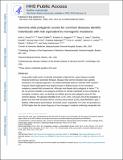| dc.contributor.author | Khera, Amit V. | |
| dc.contributor.author | Chaffin, Mark | |
| dc.contributor.author | Aragam, Krishna G. | |
| dc.contributor.author | Haas, Mary E. | |
| dc.contributor.author | Roselli, Carolina | |
| dc.contributor.author | Choi, Seung Hoan | |
| dc.contributor.author | Natarajan, Pradeep | |
| dc.contributor.author | Lander, Eric Steven | |
| dc.contributor.author | Lubitz, Steven A. | |
| dc.contributor.author | Ellinor, Patrick T. | |
| dc.contributor.author | Kathiresan, Sekar | |
| dc.date.accessioned | 2020-05-21T19:54:56Z | |
| dc.date.available | 2020-05-21T19:54:56Z | |
| dc.date.issued | 2018-08 | |
| dc.date.submitted | 2018-02 | |
| dc.identifier.issn | 1061-4036 | |
| dc.identifier.issn | 1546-1718 | |
| dc.identifier.uri | https://hdl.handle.net/1721.1/125390 | |
| dc.description.abstract | A key public health need is to identify individuals at high risk for a given disease to enable enhanced screening or preventive therapies. Because most common diseases have a genetic component, one important approach is to stratify individuals based on inherited DNA variation 1 . Proposed clinical applications have largely focused on finding carriers of rare monogenic mutations at several-fold increased risk. Although most disease risk is polygenic in nature 2–5 , it has not yet been possible to use polygenic predictors to identify individuals at risk comparable to monogenic mutations. Here, we develop and validate genome-wide polygenic scores for five common diseases. The approach identifies 8.0, 6.1, 3.5, 3.2, and 1.5% of the population at greater than threefold increased risk for coronary artery disease, atrial fibrillation, type 2 diabetes, inflammatory bowel disease, and breast cancer, respectively. For coronary artery disease, this prevalence is 20-fold higher than the carrier frequency of rare monogenic mutations conferring comparable risk 6 . We propose that it is time to contemplate the inclusion of polygenic risk prediction in clinical care, and discuss relevant issues. | en_US |
| dc.language.iso | en | |
| dc.publisher | Springer Science and Business Media LLC | en_US |
| dc.relation.isversionof | http://dx.doi.org/10.1038/s41588-018-0183-z | en_US |
| dc.rights | Creative Commons Attribution-Noncommercial-Share Alike | en_US |
| dc.rights.uri | http://creativecommons.org/licenses/by-nc-sa/4.0/ | en_US |
| dc.source | PMC | en_US |
| dc.title | Genome-wide polygenic scores for common diseases identify individuals with risk equivalent to monogenic mutations | en_US |
| dc.type | Article | en_US |
| dc.identifier.citation | Khera, Amit V. et al. "Genome-wide polygenic scores for common diseases identify individuals with risk equivalent to monogenic mutations." Nature Genetics 50, 9 (August 2018): 1219-1224 © 2018 The Author(s) | en_US |
| dc.contributor.department | Massachusetts Institute of Technology. Department of Biology | en_US |
| dc.contributor.department | Broad Institute of MIT and Harvard | en_US |
| dc.relation.journal | Nature Genetics | en_US |
| dc.eprint.version | Author's final manuscript | en_US |
| dc.type.uri | http://purl.org/eprint/type/JournalArticle | en_US |
| eprint.status | http://purl.org/eprint/status/PeerReviewed | en_US |
| dc.date.updated | 2020-01-22T18:37:03Z | |
| dspace.date.submission | 2020-01-22T18:37:05Z | |
| mit.journal.volume | 50 | en_US |
| mit.journal.issue | 9 | en_US |
| mit.metadata.status | Complete | |
